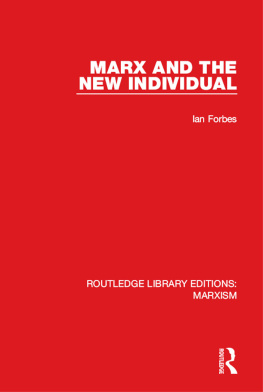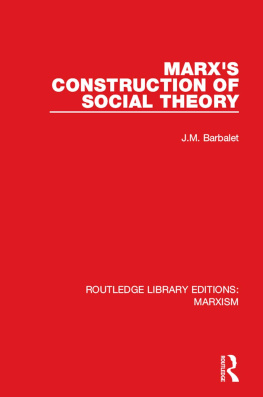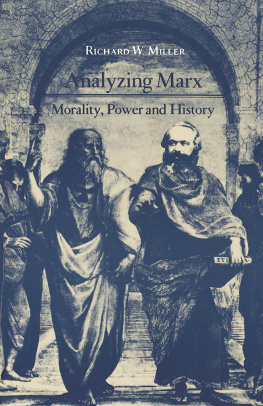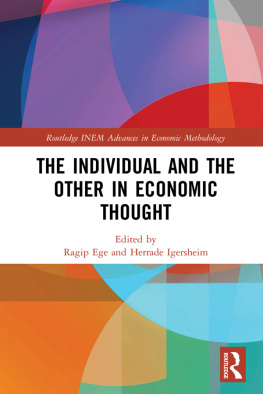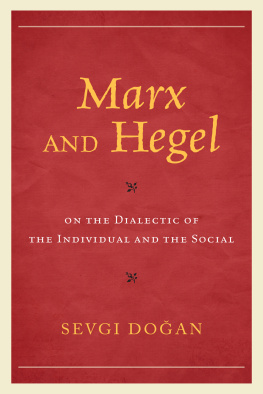ROUTLEDGE LIBRARY EDITIONS: MARXISM
Volume 11
MARX AND THE NEW INDIVIDUAL
MARX AND THE NEW INDIVIDUAL
IAN FORBES
First published in 1990
This edition first published in 2015
by Routledge
2 Park Square, Milton Park, Abingdon, Oxon OX14 4RN
and by Routledge
711 Third Avenue, New York, NY 10017
Routledge is an imprint of the Taylor & Francis Group, an informa business
1990 Ian Forbes
All rights reserved. No part of this book may be reprinted or reproduced or utilised in any form or by any electronic, mechanical, or other means, now known or hereafter invented, including photocopying and recording, or in any information storage or retrieval system, without permission in writing from the publishers.
Trademark notice: Product or corporate names may be trademarks or registered trademarks, and are used only for identification and explanation without intent to infringe.
British Library Cataloguing in Publication Data
A catalogue record for this book is available from the British Library
ISBN: 978-1-138-85502-1 (Set)
ISBN: 978-1-315-71284-0 (Set) (ebk)
ISBN: 978-1-138-88594-3 (Volume 11) (hbk)
ISBN: 978-1-315-71517-9 (Volume 11) (ebk)
Publishers Note
The publisher has gone to great lengths to ensure the quality of this reprint but points out that some imperfections in the original copies may be apparent.
Disclaimer
The publisher has made every effort to trace copyright holders and would welcome correspondence from those they have been unable to trace.
Marx and the new individual
Ian Forbes
Ian Forbes, 1990
This book is copyright under the Berne Convention. No reproduction without permission. All rights reserved.
Published by the Academic Division of
Unwin Hyman Ltd
15/17 Broadwick Street, London W1V 1FP, UK
Unwin Hyman Inc.,
8 Winchester Place, Winchester, Mass. 01890, USA
Allen & Unwin (Australia) Ltd
8 Napier Street, North Sydney, NSW 2060, Australia
Allen & Unwin (New Zealand) Ltd in association with the Port Nicholson Press Ltd,
Compusales Building, 75 Ghuznee Street, Wellington 1, New Zealand
First published in 1990
British Library Cataloguing in Publication Data
Forbes, Ian
Marx and the new individual.
1. Political ideologies: Individualism. Marxist theories, history.
I. Title
320.512
ISBN 0044454325
Library of Congress Cataloging-in-Publication Data
Forbes, Ian.
Marx and the new individual / Ian Forbes.
p. cm.
Includes bibliographical references.
ISBN 0044454325
1. Individualism. 2. Communism and individuals. 3. Marx, Karl.
18181883. I. Title.
HM136.F65 1990
302.54dc20
9031142
CIP
Typeset in 10 on 11 point Bembo
Printed by Billing and Sons
London and Worcester
To my parents,
and to Connie and Kate
Contents
Ian Forbess discussion of Marx as a theorist of individuality could not come at a more apposite time. In many ways the 1980s were marked (many would say scarred) by the dominance of a narrow individualism in much thinking about economics, politics and society. Indeed in some quarters even society itself was notoriously declared non-existent, legitimate social science being left to deal with rationally self-centred individuals choosing in the context of a free market. The dominance of these emaciated individuals of classical liberal economic theory has in turn emaciated the societies in which they stalk. With the collapse of the Communist regimes in Eastern Europe many have come to wonder whether the Marxist tradition has any better conception of individuality to offer. It has been widely thought that Marxism derogates the individual by subsuming her/him under some species of class analysis, a feature of class-divided societies to be transcended under communism. Recently the rational-choice theory of what has come to be known as analytical Marxism has tried to effect a compromise between socialist ideas and the dominant ethos of capitalist societies. Ian Forbess work on Marx is bolder: he shows that at the origin of the Marxist tradition, in the work of Marx himself, there lies an all-pervasive and far richer concept of individuality. Forbes demonstrates that Marx, with his developmental view of human nature, assumed that humankind could expand its individuality to such an extent that individuals themselves would constitute a force powerful enough to break down social institutions that had hitherto prevented that individuality from realising its full potential. On Forbess account, Marxs consideration of the individual can generate not only a radical critique of contemporary society but also a vision of an alternative of which both East and West stand in such evident need.
David McLellan
December 1989
The puzzle of the individual
Is the individual a central feature of Marxs account of social existence, or something to be transcended? This is the question this book examines, with specific reference to the role in Marxs thought of the concepts of human nature and historical development. The issue of the individual warrants close analysis for a number of reasons. First, for the Marxian critique of contemporary society and explanation of historical change to be more potent as a theory and more responsive to political and social developments, a more complete understanding of the individual is vital. It is, therefore, important to demonstrate that Marxs thought, in its structure and interest, has more potential significance for explanations of the individual in society than theories which explicitly purport to provide such explanations.
Second, individuality is contrasted with individualization and with individualism. Individualization describes the process whereby society gives rise to and forms the individual. Here the environmental context is of interest and importance for a theory of society, not individuals themselves. Individualism, however, focuses on the notion of the individual in order to derive accounts of politics and society. The significance of the individual for any theory of society, then, is contentiously bound up with issues like the content of the individual as a representative of human nature and the form that individuals take in actual societies. Individuality denotes a richer and more accurate way of understanding the individual, in so far as the individual is taken to be neither a blank sheet nor the fundamental unit of analysis. That is, the concept of individuality locates the individual in a critical theory of society in a way that is consistent with Marxs thought, even though this aspect has not yet been fully acknowledged.
Third, Marx is conventionally understood to be antagonistic to theories in which the individual is of theoretical and practical importance. He is said to make individuals entirely subject to historical processes rooted in material needs, to conceive only of collectivities and to place historical significance on class antagonisms which are the material expression of development arising out of objective (but not yet fully human) social forces. Furthermore, consciousness of the true nature of society and the real basis for proper human existence apparently relate to and spring from class experience, not individual existence. Each of these claims comes under direct and critical scrutiny.

